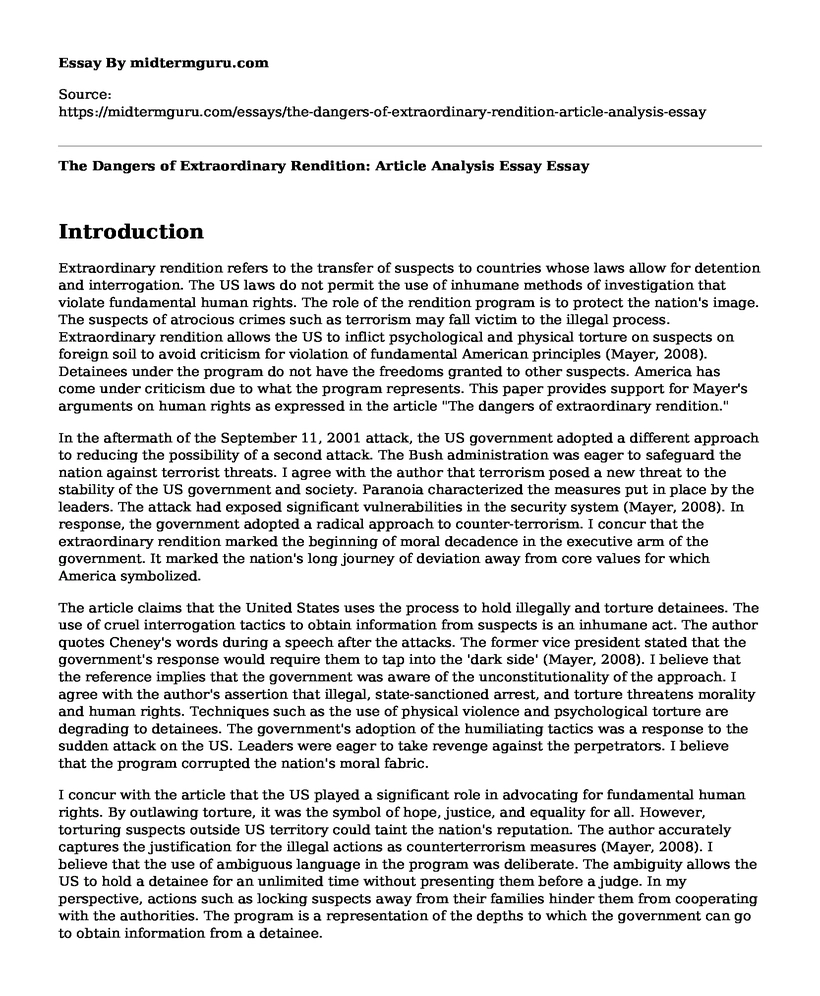Introduction
Extraordinary rendition refers to the transfer of suspects to countries whose laws allow for detention and interrogation. The US laws do not permit the use of inhumane methods of investigation that violate fundamental human rights. The role of the rendition program is to protect the nation's image. The suspects of atrocious crimes such as terrorism may fall victim to the illegal process. Extraordinary rendition allows the US to inflict psychological and physical torture on suspects on foreign soil to avoid criticism for violation of fundamental American principles (Mayer, 2008). Detainees under the program do not have the freedoms granted to other suspects. America has come under criticism due to what the program represents. This paper provides support for Mayer's arguments on human rights as expressed in the article "The dangers of extraordinary rendition."
In the aftermath of the September 11, 2001 attack, the US government adopted a different approach to reducing the possibility of a second attack. The Bush administration was eager to safeguard the nation against terrorist threats. I agree with the author that terrorism posed a new threat to the stability of the US government and society. Paranoia characterized the measures put in place by the leaders. The attack had exposed significant vulnerabilities in the security system (Mayer, 2008). In response, the government adopted a radical approach to counter-terrorism. I concur that the extraordinary rendition marked the beginning of moral decadence in the executive arm of the government. It marked the nation's long journey of deviation away from core values for which America symbolized.
The article claims that the United States uses the process to hold illegally and torture detainees. The use of cruel interrogation tactics to obtain information from suspects is an inhumane act. The author quotes Cheney's words during a speech after the attacks. The former vice president stated that the government's response would require them to tap into the 'dark side' (Mayer, 2008). I believe that the reference implies that the government was aware of the unconstitutionality of the approach. I agree with the author's assertion that illegal, state-sanctioned arrest, and torture threatens morality and human rights. Techniques such as the use of physical violence and psychological torture are degrading to detainees. The government's adoption of the humiliating tactics was a response to the sudden attack on the US. Leaders were eager to take revenge against the perpetrators. I believe that the program corrupted the nation's moral fabric.
I concur with the article that the US played a significant role in advocating for fundamental human rights. By outlawing torture, it was the symbol of hope, justice, and equality for all. However, torturing suspects outside US territory could taint the nation's reputation. The author accurately captures the justification for the illegal actions as counterterrorism measures (Mayer, 2008). I believe that the use of ambiguous language in the program was deliberate. The ambiguity allows the US to hold a detainee for an unlimited time without presenting them before a judge. In my perspective, actions such as locking suspects away from their families hinder them from cooperating with the authorities. The program is a representation of the depths to which the government can go to obtain information from a detainee.
Conclusion
In conclusion, extraordinary rendition is not a productive approach. The use of torture inflicts constant pain on the suspects. Torturing suspects violate human rights and have lasting effects on the suspect. I believe that the use of physical violence to extract information from detainees is wrong and unjust. The rendition program goes against the values and traditions of the American people. Thus, I support the author's argument that holding people against their will without due process is a violation of the American Constitution.
References
Mayer, J. (2008). The Dangers of Extraordinary Rendition. NPR. Retrieved from https://www.npr.org/2008/09/18/94754692/jane-mayer-the-dangers-of-extraordinary-rendition
Cite this page
The Dangers of Extraordinary Rendition: Article Analysis Essay . (2022, Sep 07). Retrieved from https://midtermguru.com/essays/the-dangers-of-extraordinary-rendition-article-analysis-essay
If you are the original author of this essay and no longer wish to have it published on the midtermguru.com website, please click below to request its removal:
- Reasons for Obamas Election Victory - Essay Example
- Essay on the Executive Office of the President and Its Functions
- Elements of Good Governance - Paper Example
- The Argument Against the Paris Accord by President Trump
- Research Paper on E-Government Website
- Essay Sample on Social Policy and Economic Policy
- 1990s: Internet Revolutionizing Global Interaction & Democratization - Essay Sample







